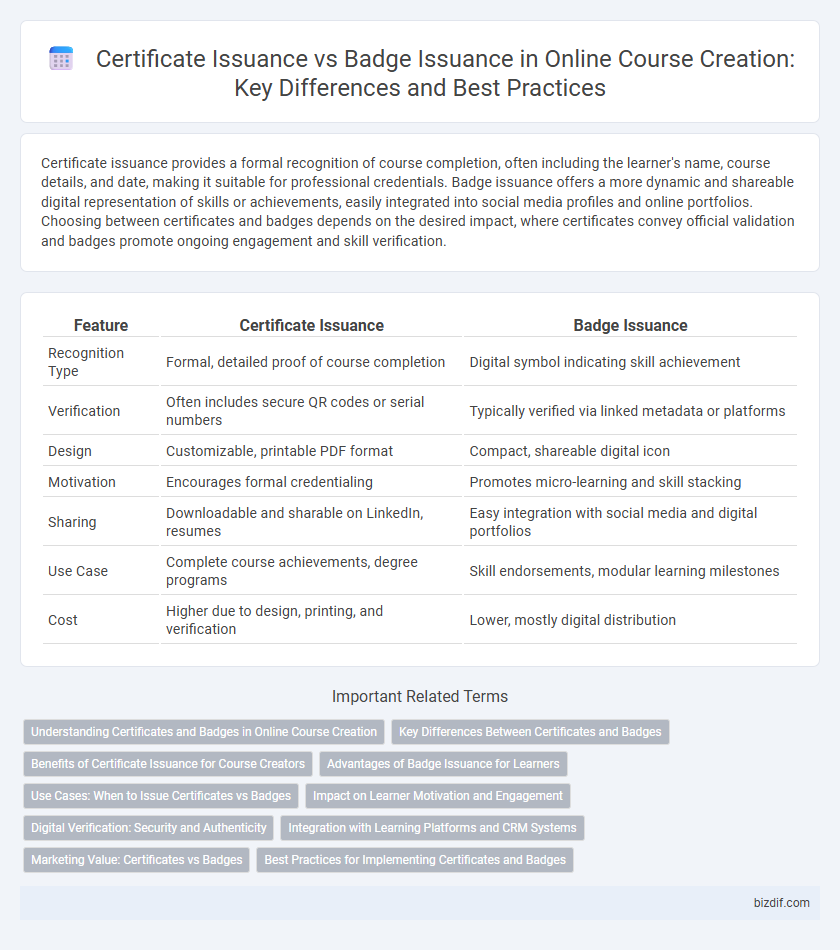Certificate issuance provides a formal recognition of course completion, often including the learner's name, course details, and date, making it suitable for professional credentials. Badge issuance offers a more dynamic and shareable digital representation of skills or achievements, easily integrated into social media profiles and online portfolios. Choosing between certificates and badges depends on the desired impact, where certificates convey official validation and badges promote ongoing engagement and skill verification.
Table of Comparison
| Feature | Certificate Issuance | Badge Issuance |
|---|---|---|
| Recognition Type | Formal, detailed proof of course completion | Digital symbol indicating skill achievement |
| Verification | Often includes secure QR codes or serial numbers | Typically verified via linked metadata or platforms |
| Design | Customizable, printable PDF format | Compact, shareable digital icon |
| Motivation | Encourages formal credentialing | Promotes micro-learning and skill stacking |
| Sharing | Downloadable and sharable on LinkedIn, resumes | Easy integration with social media and digital portfolios |
| Use Case | Complete course achievements, degree programs | Skill endorsements, modular learning milestones |
| Cost | Higher due to design, printing, and verification | Lower, mostly digital distribution |
Understanding Certificates and Badges in Online Course Creation
Certificates in online course creation serve as formal recognition of course completion, often including details like course title, participant name, and issuing institution, enhancing credibility and resume value. Badges offer a more flexible, micro-credential approach by visually representing specific skills or achievements earned during the course, promoting skill-based learning and digital sharing. Understanding the distinct purposes and benefits of certificates and badges helps educators design effective assessment and motivation strategies tailored to learner goals and course structure.
Key Differences Between Certificates and Badges
Certificates in online course creation typically represent the completion of a full course or program and carry formal recognition often issued by educational institutions or platforms. Badges are digital representations of specific skills or achievements within a course, often micro-credentials that highlight competence in particular areas without requiring full course completion. Certificates provide a more comprehensive validation of learning, while badges offer granular acknowledgment of individual accomplishments and skill mastery.
Benefits of Certificate Issuance for Course Creators
Certificate issuance enhances course creators' credibility by providing official recognition of learner achievements, boosting course value and marketability. Certificates offer tangible proof of skill acquisition, increasing student motivation and completion rates, which positively impacts course reputation and revenue. Additionally, certificates facilitate partnerships with employers and institutions, expanding the course creator's influence and professional network.
Advantages of Badge Issuance for Learners
Badge issuance offers learners a versatile and easily shareable recognition of skills, enhancing their digital portfolios on platforms like LinkedIn and personal websites. Unlike traditional certificates, badges can be embedded with metadata that verifies achievement details, increasing credibility and employer trust. This micro-credentialing approach motivates continuous learning by providing immediate, on-demand recognition for specific competencies.
Use Cases: When to Issue Certificates vs Badges
Certificates are ideal for marking course completion and formal achievements, often used in professional development or academic settings where proof of mastery is required. Badges serve to recognize specific skills, milestones, or participation, making them suitable for gamified learning environments and micro-credentialing. Issuing certificates is best for comprehensive accomplishments, while badges work well for motivating ongoing engagement and skill validation.
Impact on Learner Motivation and Engagement
Certificate issuance often leads to higher learner motivation and engagement by providing tangible proof of skill mastery and professional credibility. Badges, being visually engaging and easily shareable on digital platforms, encourage continuous learning through gamified recognition and social validation. Together, certificates and badges create a complementary system that enhances learner commitment by combining formal achievement with ongoing motivational incentives.
Digital Verification: Security and Authenticity
Digital verification enhances certificate issuance by embedding encrypted QR codes and blockchain technology, ensuring unparalleled security and authenticity. Badges offer dynamic verification through metadata linked to the issuer's database, allowing real-time validation and reducing fraud risks. Both methods leverage digital tools, but certificates often carry more formal recognition, while badges provide flexible, easily shareable proof of achievement.
Integration with Learning Platforms and CRM Systems
Certificate issuance often involves standardized formats like PDF that seamlessly integrate with learning management systems (LMS) such as Moodle, Canvas, or Blackboard, facilitating easy tracking of course completion and learner achievements. Badge issuance leverages interoperable credentials like Open Badges, which can be embedded within LMS platforms and automatically synced with CRM systems like Salesforce or HubSpot to enhance learner engagement and streamline credential management. Both methods support API-based integration, enabling real-time data exchange between online course platforms and enterprise CRM systems for personalized marketing and learner analytics.
Marketing Value: Certificates vs Badges
Certificates provide a formal recognition with high perceived value that enhances learners' resumes and LinkedIn profiles, making them powerful marketing tools for course creators targeting professionals seeking career advancement. Badges offer versatile, shareable symbols of skill mastery that increase learner engagement and visibility across social media and digital platforms, driving broader brand awareness for online courses. Combining both certificates and badges maximizes marketing impact by appealing to different learner motivations and showcasing achievement in multiple formats.
Best Practices for Implementing Certificates and Badges
Implementing certificates and badges in online course creation enhances learner motivation and validates skill acquisition effectively. Best practices include ensuring certificates contain verifiable, personalized information such as learner name, course title, and completion date, while badges should represent specific competencies or milestones with metadata linking to evidence. Integrating automated issuance systems and secure verification methods boosts credibility and streamlines the recognition process for both certificates and badges.
Certificate issuance vs Badge issuance Infographic

 bizdif.com
bizdif.com